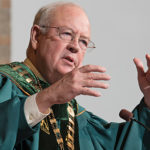WACO—Baylor University’s board of regents approved a 4 percent tuition increase for 2018-19, the lowest percentage increase in more than 20 years, at its July 21 meeting—the first led by a new board chair operating within a revamped governance structure.
Joel Allison, former Baylor Scott & White Health chief executive officer, chaired the meeting, the first held since Linda Livingstone became the university president, and the first seven newly elected regents attended.
 Linda Livingstone answered questions from the news media after attending her first Baylor board of regents meeting as the university’s president. (Photo/Robert Rogers/Baylor Marketing & Communications)Regents set the university’s tuition for the 2018-19 school year at $41,194—or $20,597 each for the fall semester and spring semester—plus a $4,348 general student fee for the year.
Linda Livingstone answered questions from the news media after attending her first Baylor board of regents meeting as the university’s president. (Photo/Robert Rogers/Baylor Marketing & Communications)Regents set the university’s tuition for the 2018-19 school year at $41,194—or $20,597 each for the fall semester and spring semester—plus a $4,348 general student fee for the year.
Livingstone noted the tuition and fees remain lower than other private Texas universities of comparable size.
‘Looking out the windshield, not the rearview mirror’
During an executive session, the board heard updates on legal matters and the various ongoing investigations related to Baylor’s sexual abuse scandal, Allison confirmed.
Earlier this month, Baylor settled one of six Title IX lawsuits. The NCAA is investigating Baylor, and the Big 12 Conference is conducting its own independent review of Baylor’s athletic procedures and university governance.
 Joel Allison emphasizes to reporters the importance of learning from the past while focusing on the future. (Photo/Robert Rogers/Baylor Marketing & Communications)“We are cooperating in every way possible” with the various investigations, Allison said, emphasizing the university wants “to be the best at compliance” with Title IX and other applicable laws.
Joel Allison emphasizes to reporters the importance of learning from the past while focusing on the future. (Photo/Robert Rogers/Baylor Marketing & Communications)“We are cooperating in every way possible” with the various investigations, Allison said, emphasizing the university wants “to be the best at compliance” with Title IX and other applicable laws.
“I’m a big believer in looking out the windshield, not the rearview mirror,” he said.
Sign up for our weekly edition and get all our headlines in your inbox on Thursdays
At the same time, he added, quoting Bears Football Coach Matt Rhule, Baylor needs to “understand and learn from the past and continue to do better.”
Governance reforms in place
The July 21 meeting was the first conducted under governance reforms the regents approved in February. Those reforms created an expanded executive committee and a task force for regent selection.
The governance changes also granted voting rights to regents representing the Baylor Line Foundation, the “B” Association of former athletic lettermen, the Bear Foundation and two faculty members, as well as a student regent serving a second term.
The seven new regents who joined the board are Jill Manning of Dallas, a retired executive; Alicia D.H. Monroe of Missouri City, provost and senior vice president at the Baylor College of Medicine; Melissa Purdy Mines of Austin, alumni-elected regent; Gaynor Yancey, director of the Center for Family and Community Ministries in Baylor’s Diana R. Garland School of Social Work, faculty regent; Dusty Sanderson of Amarillo, Baylor “B” Association regent; and student regents Hannah Vecseri of Houston and Will Cassara of Keller.
The board also appointed a new alumni-elected regent, Gordon Wilkerson of Lubbock.
‘There is hope in this new regent leadership
The new board leadership, new president and new governance structure caught the attention of some previous critics of the board of regents.
For 15 years, the Baylor Alumni Association and the organization that succeeded it, the Baylor Line Foundation, made no secret of its often-tense relationship with Baylor’s regents and, sometimes, its administration. But in a July 18 article, Baylor Line Foundation President Jackie Baugh Moore cited reasons for hope.
As positive signs, she noted Allison attended a recent Baylor Line Foundation event; Dan Chapman, vice chair of the board of regents, made contact with foundation leaders; Wayne Fisher, incumbent alumni-elected regent, attended the foundation’s executive committee meeting; and newly elected alumni representative on the board of regents Mims attended the group’s membership meeting.
“There is hope in the new regent leadership,” Moore wrote. “The addition of new faces including alumni-elected regents, plus faculty and student regents, gives me hope that our culture will be less like a nation and more like a family again. I believe the majority of this board recognizes the awesome responsibility that comes with being a self-perpetuating body.
“I believe there will be a return to a true fiduciary-minded board that will work hard to represent the interests of all Baylor alumni and stakeholders. I believe this board recognizes the importance of openness, honesty, candor and accountability to those same stakeholders and alumni.”
Moore also pointed to the “fresh perspective and new energy” Livingstone brings to Baylor as its president.
“She is well respected in academic circles and among her peers. She has had experience in college athletics, as well, and understands the inherent pressures and the need for proper balance,” she wrote. “I believe Dr. Livingstone will be an effective and wise leader at this critical time in the life of Baylor. We look forward to working with her.”
‘We want to hear all the voices’
In response to a question about whether regents have made similar effort to communicate with Bears for Leadership Reform, an organization of alumni and donors who had been critical of previous regent leadership, Allison said: “We’re talking to everybody. … We’ve got a great Baylor Family, and we want to hear all the voices.”
The common characteristic that unites regents, members of the Baylor Line Foundation and members of Bears for Leadership Reform is a deep love for Baylor, he insisted.
“We’re all passionate about Baylor. … I’m here to talk to anyone who loves Baylor like I do,” Allison said.
In other business, regents approved two academic degree programs:
- A joint degree in physical education and sports pedagogy that allows students to earn both a bachelor of science in education degree and master of science degree, as well as a teaching certification, in five years.
- An executive master’s degree in litigation management at the Baylor Law School.
Regents also authorized a $2 million pledge payment as part of the university’s affiliation agreement with the Baylor College of Medicine.














We seek to connect God’s story and God’s people around the world. To learn more about God’s story, click here.
Send comments and feedback to Eric Black, our editor. For comments to be published, please specify “letter to the editor.” Maximum length for publication is 300 words.